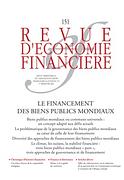Public Funding for Development and Global Public Goods: How Can They Be Measured?
October 23, 2024




Dequiedt V., De Ubeda A-A., Rota-Graziosi G. (2023) "Des taxes affectées pour financer les biens publics mondiaux : pertinence et mise en œuvre", Revue d'économie financière 2023/3, vol. 151(3), pp. 187 à 199

